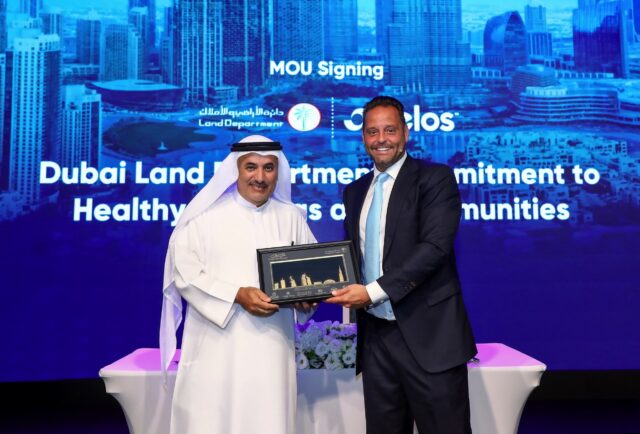“The Future of Health, Wellness and Innovation Forum”, organised by the Dubai Land Department
(DLD), in partnership with Delos, a company promoting well-being in living and working places,
kicked off at the Museum of the Future in Dubai, in the presence of officials and experts.
The forum highlighted the importance of strengthening buildings and residential communities and
making them healthier, safer and smarter, in line with the DLD’s strategy to consolidate Dubai’s
position as a preferred global real estate destination.
During his opening speech at the forum, Sultan Butti bin Mejren, Director-General of the Dubai Land
Department, stated, “Health and safety issues have always been fundamental pillars of the UAE’s
strategy, and Dubai in particular, towards ensuring growth by promoting innovation and
sustainability, in line with the developmental approach pursued by the wise leadership under the
guidance of His Highness Sheikh Mohammed bin Rashid Al Maktoum, Vice President, Prime
Minister and Ruler of Dubai.”
Bin Mejren added, “The Dubai 2040 Urban Master Plan draws an integrated future map for
sustainable urban development, the main focus of which being people and the improvement of their
quality of life. From this standpoint, health, safety, and innovation standards have become integral to
achieving Dubai’s vision to become the best city in the world to live and work.”
Paul Scialla, CEO of Delos and Founder of IWBI, shared his insight and future vision on the Global
WELL Healthy Building Movement and said, “It is a great honour to be here today to announce and
celebrate the collaboration between Delos and the DLD. It is wonderful to see all these people
coming together with this singular focus, the well-being and health safety of our buildings. This is
because of the commitment of the DLD and the initiative their leadership has taken. I could not be
more honoured to demonstrate to the world an example such as Dubai, which now has received the
most well-rated buildings per capita in the world, and we are just getting started. A forum like this
demonstrates to the public and private sectors how important this is, how immediate the need is, and
how well it has been received. This type of forum, with this energy and demonstration of
commitment, will breed more success and opportunity in the future.”
Five panel discussions
The forum witnessed the organising of five panel discussions. The first session shed light on the
future of health and well-being in buildings and communities, with the participation of Eng Marwan
bin Ghalita, CEO of the Real Estate Regulatory Agency; Paul Scialla; Anas Kassem, Managing
Director of Stantec, and Rob Devereux, CEO of Brookfield Properties Middle East.
During the session, Marwan bin Ghalita highlighted the importance of healthy and sustainable
buildings as part of RERA’s strategy for the future of buildings in Dubai. Scialla spoke about the
impact of healthy buildings on occupants, visitors and anyone spending time in the buildings and
how this has changed since COVID-19. Kassem shared Stantec’s experience in designing
healthcare buildings to be responsive and compatible with the dynamic nature of the sector.
Devereux addressed the foremost health and sustainability considerations during the development
of ICD Brookfield Place Dubai and how they will evolve into the future.
In another significant session titled “A Holistic Approach to Healthy Buildings: Wellness in Design,
Operation and Behaviour”, Dr. Abeer Shaheen from the ADNOC Group spoke about the impact of
adopting the “WELL Health and Safety” classification standards on ADNOC’s ESG strategy for
environmental, social and corporate governance. Ahmed Khalil Al Hamdani, from the DLD, shed
light on how RERA employs health, safety and sustainability regarding jointly owned properties.
Francis Giani, Chief Community Management Officer at Nakheel, discussed the importance of the
company achieving the “WELL Health and Safety” rating and how investing in the health of residents
and employees affected the company’s performance. Samer Jani, Director of SAGA International,
spoke about the strategies being applied to buildings to accelerate the shift to sustainable and
healthy development.
UAE National Wellbeing Strategy 2031:
The third session focused on Vision 2031: “Challenges and Opportunities for Human Health, Well-
Being, and Sustainability”, with the participation of Saeed Al Abbar, CEO of AESG; Farah Naz,
Director of Innovation and ESG MENA – AECOM, and Mario Saab, Head of Sustainability MENA –
Cundall, who addressed the strengthening relations between the public and private sectors, in line
with the UAE National Wellbeing Strategy 2031, and the most prominent climate challenges faced by
stakeholders when designing projects.
The fourth session highlighted “The Impact of Health and Sustainability across Government,
Commercial, Residential and Hospitality”, and was attended by Awatif Al Suwaidi, CEO of the
Happiness and Well-Being Council, Dubai Police; Khalid Anib, Chief Executive Officer – Abu Dhabi
National Hotels. and Jalil Mekouar, Founder and CEO of InHovate Technology.
In the fifth and final panel, Dr. Mohammad AlJaradin, Associate Professor – School of Health and
Environmental Studies at HBMSU; Umar Khan, General Manager – Sustainably and Smart Cities at
Honeywell; and Ala’a Ahmad, Facilities and Services Senior Manager at HBMSU; highlighted the
premise of well-being and health provided by modern technology in the education sector.
The forum also witnessed a number of side events and talks, where Dr. Mansoor Al Awar, President
of Hamdan Bin Mohammed Smart University, shared his future visions on health, well-being and
education, while Dr. Naseem Abdullah, Director of Health and Safety Department, Dubai
Municipality, shared her visions on the quality of indoor air and water systems in the built
environment during a fireside chat, while Nadima Mehra and Scott Armstrong addressed “Expo City
Dubai: The Next Chapter”.
Memorandum of Understanding
On the sidelines of the forum’s activities, the DLD and Delos Company signed a Memorandum of
Understanding on initiatives, products and solutions for the healthy building movement. The
memorandum explores opportunities and prospects for joint cooperation in hosting events related to
healthy buildings and communities, exchanging experiences and knowledge about the healthy
building movement, and recommending the best scientifically approved health technologies,
solutions and products, among others.










